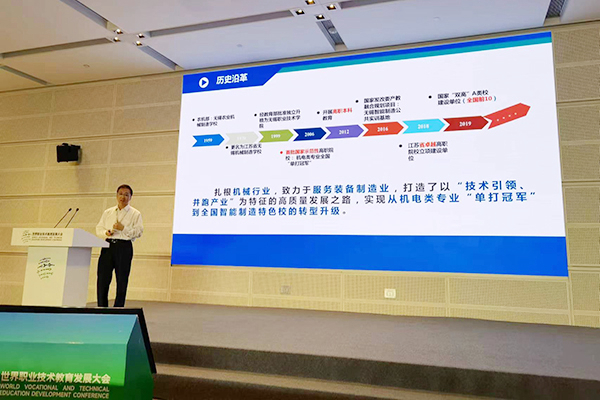Held in Tianjin on August 19 and 20, the First World Vocational and Technical Education Development Conference was the first institutional conference of great international influences in the field of vocational education organized by the Chinese government and was included as deliverables of President Xi Jinping’s global development initiatives. Sun Chunlan, member of the Political Bureau of the CPC Central Committee and Vice Premier of the State Council, read out a congratulatory letter from President Xi Jinping and delivered a video speech at the opening ceremony. Some 700 delegates from 123 countries around the world attended the conference. Ministers of Education from 25 countries, ambassadors from 15 countries, heads and representatives of 17 international organizations attended the conference at offline venues or via video link to exchange views on current hotspot issues of global concern.
Prof. Gong Fanghong, Secretary of the CPC WXIT Committee, was invited to attend the conference and delivered a keynote speech themed on “Serve the Development of a Skill-based Society Guided by Technology with Broader Coordination” at the parallel session on Engineering Education Development in Vocational Education Institutions.
Prof. Gong Fanghong pointed out in his speech that the vigorous development of new economy represented by new technologies, new industries, new models and new industries has put forward higher requirements for technical talent in engineering, so it is of urgent needs to accelerate reform and innovation of engineering education. According to the 2022 new version of Vocational Education Law of the People’s Republic of China, the goal of vocational education is to cultivate high-caliber technical personnel. In order to achieve high-quality development, vocational education must integrate engineering education theories and foster a large number of excellent and high-caliber technical personnel and great craftsmen, so as to support the development of national economy in the new era.
Moreover, in order to meet the needs of the development of new economy and new industry, vocational institutes are bound to take actions. Engineering education is diverse and multi-layered, which requires technical personnel adept at practical work and field engineers with sound scientific literacy and abilities to solve complex problems. Vocational institutes should accommodate development of local industries, strengthen cooperation with enterprises, and improve the quality of engineering talent. To be specific, institutes should explore new methods and paths of training technical talent and field engineers, combine the needs of industrial transformation and upgrading with such aspects as teaching contents, teaching models, teaching methods and learning methods, and carry out reform and innovation in engineering education based on the principle of cultivating basic scientific literacy, mastering specific professional knowledge, focusing on application of engineering technology and strengthening practical operation. Over the years, Wuxi Institute of Technology has been unswervingly exploring systematic cultivation methods of technical C-C-I (Certified, Compound, Innovative) talent under the guidance of reform on teachers, teaching materials and teaching methods. Efforts have been made in the cultivation of talent in order to meet rapid industrial transformation and development through working out occupational classification with industries, in the establishment of flexible curriculum system under the credit-based framework in order to make teaching contents conform with new industrial technologies, and in the development of various channels for the growth of students through free selection of majors, participation in certificate exams and talent selection through competitions. By doing so, the Institute explores an effective reform on teaching model integrating posts, classes, competitions and certificates based on the cultivation of vocational abilities.
He highlighted that engineering education is a product of the industrialization era, and the level of industrialization has driven the development of vocational education. Vocational education in the new era must keep abreast of new technologies, new techniques and new standards, update professional settings, teaching contents and teaching resources in a timely manner, and cultivate a large number of technical personnel meeting the needs of industrial development, so as to serve the construction of a skill-based society. Wuxi Institute of Technology has applied a technology-led approach in promoting digital transformation and upgrading of specialty construction, and integrated industry, academia, research, and application. In response to bottlenecks and difficulties of digital and intelligent transformation faced by manufacturing enterprises in Wuxi, the Institute takes the whole life cycle of design, production, logistics, sales and service of intelligent manufacturing as the main line, strengthens cooperation with flagship industrial enterprises, and makes greater efforts to establish the Intelligent Manufacturing Engineering Centre. It is an industry-education integration platform in intelligent manufacturing sector that combines talent training, technology research and development, teacher training, technical services, social training and production demonstration. By leveraging the platform, the Institute has actively engaged in such works as working out national industry technical standards, providing services to facilitate technology research of small and medium-sized enterprises, joint construction of industrial colleges by institutes and enterprises, development of teaching standards, and training of enterprise employees, which effectively promote the upgrading of vocational education specialties and the reform of talent training model.
Prof. Gong made it clear that the role of engineering education as an engine for economic and social development and industrial upgrading has become increasingly prominent, and it is of great importance to make use of engineering education accreditation concept to improve the quality and credibility of talent receiving higher vocational education and enhance the adaptability of higher vocational education. Higher vocational institutions should establish a sound teaching diagnosis and improvement system, adopt a student-centered and result-oriented approach, build a teaching quality guarantee system of continuous improvement and cyclical upgrading, and lay a solid foundation for improving the quality of talent training. By taking the opportunity of accreditation of some engineer education specialties, Wuxi Institute of Technology has advanced teaching reform in recent years through integrating engineering education specialty accreditation standard and pursued a teaching method of specialty that is result-oriented, measured in various aspects and continuously improved. Efforts have been made to build the digital 1+5 system of vocational education so as to propel the reform of teaching model and governance method through digital transformation. By taking the opportunity of being included in the first batch of pilot units in the Smart Brain project of vocational education launched by the Ministry of Education, the Institute has promoted and deepened teaching diagnosis and improvement supported by the construction of a smart campus and driven by the incentive and constraint mechanism and internal quality culture. With all these efforts, Wuxi Institute of Technology became the first to be officially reviewed as a national pilot institution for teaching diagnosis and improvement.



